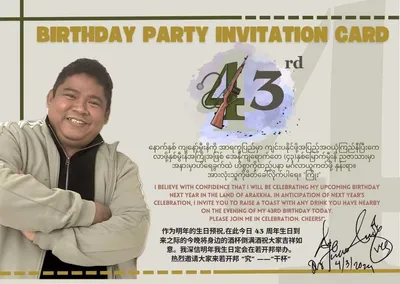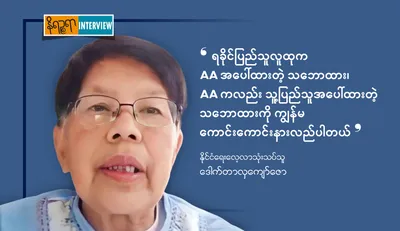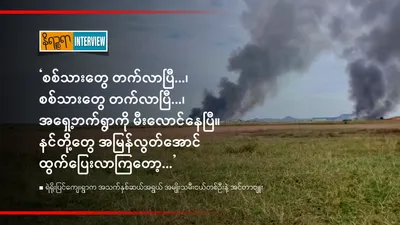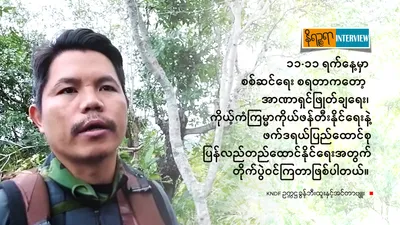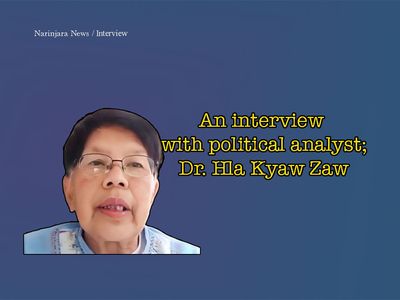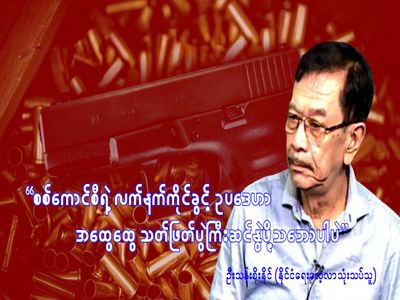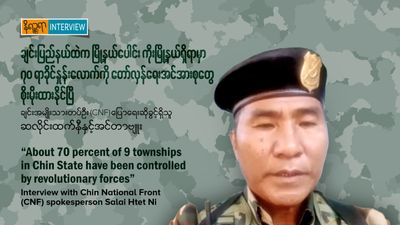- Web Master
- March 06, 2024
“It is very important what steps China will take after the failed talk? U Ye Tun, ex-lower house representative
- By: Web Master
- | Date: 12 June 2023
- | Viewer: 8.7k
“It is very important what steps China will take after the failed talk? What will China do again? Will China be quiet?” U Ye Tun, ex-lower house representative of Hsipaw Township from White Tiger Party
The military council’s National Solidarity and Peacemaking Negotiation Committee (NSPNC) held a talk with the Three Brotherhood Alliance, namely the Myanmar National Democratic Alliance Army (MNDAA)-Kokang, the Ta’ang National Liberation Army (TNLA) and the Arakan Army (AA) in Mongla in the eastern Shan State in early June.
Due to the Chinese government’s pressure, the leaders of both sides were scheduled to hold talks from 1 to 3 June, but the talks ended on the second day. Fighting took place between the MNDAA-Kokang and the military council in the area where Kokang army is active in northern Shan State when the talk was going on.
The Narinjara interviewed ex-Lower House MP U Ye Tun, who is proficient in political, military and Chinese affairs, about why did the Mongla talk fail, will the Chinese government’s mediation in Myanmar’s internal conflict go ahead and will the current armed conflict continue. U Ye Tun is an ex-lower house representative of Hsipaw Township, from the Shan Nationalities Democratic Party (SNDP) (or) White Tiger party.
Q: In early June, it was learned that the talk between the military council and the Three Brotherhood Alliance-MNDAA, the TNLA and the AA in Mongla ended without any good result. Then, fighting is taking place in northern Shan State. Can you give a comment on this situation?
A: According to the news on social media, the MNDAA began attacking the army. It is not a strange thing. Before this talk, in an interview, the TNLA said that China put pressure on it to hold talks with the State Administration Council (SAC). The TNLA doesn’t seem to hold the talk. It has to inevitably attend the talk. So, the meeting ended without taking too much. The TNLA’s primary stance is that no need to hold talk and it has no desire to hold the talk. It is expected that it shall continue to fight.
Q: The United States has enacted the Burma Act for Myanmar’s Spring Revolution to provide non-lethal aid. China is concerned that it may spread to the Ethnic Armed Organizations (EAOs). China has made a pre-emptive attempt. The main thing is China doesn’t want the National Unity Government (NUG) and the EAOs to liaise with it. Does the talk turn sour due to it?
A: According to the news I have heard, they haven’t said anything about it yet. That is what the SAC will say. The other side (Three Brotherhood Alliance) discussed the matters on the release of detained members, the removal of the AA from the list of unlawful associations and providing aid to the storm-hit people in cooperation with the SAC. The SAC aim is to start advancing the democratic federal system. The Three Brotherhood Alliance did not respond to the SAC’s discussions. The talk ended on the second day, saying that they would have to consult again. I see it as a situation where there is no practical demand or discussion on the part of the SAC. The talks stopped without any agreement.
Q: Fighting takes place in northern Shan State while the talk is going on. Do you think that fighting will occur in the areas where the TNLA and the AA are active as the meeting is attended by all members of the Three Brotherhood Alliance?
A: Fighting may take place in northern Shan State where the TNLA and the MNDAA are active. I think the AA will not carry out military activities as the AA is grappling with rehabilitation works in storm-hit Arakan State. The resumed fighting may make the people more difficult. I think the SAC doesn’t want to open the new military front. It is convenient for the SAC to pay attention to the current military fronts. What I want to say is that fighting shall not resume in Arakan State, I think.
Q: What can we further expect for peace as the Mongla talk did not produce a good result? To what extent can we expect peace?
A: The current conflict is between the SAC and the EAOs which formed with the NUG and the PDF. For instance, the UWSA, the SSA and the RCSS are not included in the conflict. They are fighting against the army by designating 2023 as a decisive year. The NUG and the PDF are not in a position to hold a talk even if the army extends an olive branch to them. Both sides do not accept it. The SAC has designated the NUG and the PDFs as the terrorist organizations. The SAC will hold talks with the EAOs. The NUG and the PDF also have declared the SAC as the terrorist military council. They have already said they would not hold talks with the SAC. At present, the NUG assumes that it has got the upper hand. I think the NUG will not hold talks even if the SAC changes its stance. In my view, the armed conflict remains in Myanmar.
Q: To what extent can we further expect from the Chinese government which cannot produce the good result from the Mongla talk? May I know your view as most of the people in Myanmar are engaging in anti-China movements?
A: China has been keeping a watchful eye on Myanmar’s internal affairs. China is constantly and anxiously monitoring the US’s weapon assistance to Myanmar. China has agreed to and supported ASEAN’s five-point consensus since the approval of consensus. However, China shows opposition to the arms assistance by foreign countries. The Northern Alliance is forced to hold this discussion as a pre-emptive attempt. China will be disappointed with the failed talk. China will not be very worried if weapons are available on the black market based on the foreign intervention. China will be very careful if a foreign country provides weapons. In particular, China is concerned about the US’s influence on Myanmar. It is very important what steps China will take after the failed talk? What will China do again? Will China be quiet?” In the past, Deng Xiaoping urged the Burmese Community Party (BCP) and the U Ne Win Administration. The dialogue materialized. The BCP inevitably held a dialogue although it defied Deng Xiaoping. Then, Deng Xiaoping neglected the BCP. The prolonged relationship between Deng Xiaoping and the BCP turned sour until the collapse of the BCP as the BCP did not listen to him and accept his political view. The relationship was not good. Myanmar had such a history.
Q: Is there anything to add about the Mongla talk?
A: At present, both sides think that they have military advantages. According to the statements and words from both sides, they are conducting operations by changing their military tactics based on the situation. Now, efforts for territorial control by marching and capturing the enemy outposts by the ground forces no longer work. The army conducts surprise airstrikes and relies on the air force for the movement of troops. It also depends on how much they can use these forces sufficiently. At a time when both sides think that they get the upper hand, neither side wants demands for peace talks.

